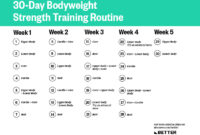Good strength training routine is more than just lifting weights; it’s a carefully designed program tailored to individual goals and capabilities. This guide explores the key components of building a successful routine, from understanding different training goals (hypertrophy, strength, power) and designing effective workouts to optimizing nutrition and recovery for optimal results. We’ll delve into exercise selection, program design, common mistakes to avoid, and strategies for overcoming plateaus, ensuring you build a sustainable and effective strength training journey.
We will cover various training splits, including full body, upper/lower, and push/pull/legs, and discuss the importance of compound exercises. We’ll also address common concerns such as proper form, injury prevention, and adapting routines for different fitness levels and limitations. Ultimately, the aim is to empower you to create a personalized plan that helps you achieve your strength training objectives safely and efficiently.
Nutrition and Recovery for Optimal Results
Optimizing your nutrition and recovery strategies is just as crucial as your actual strength training workouts. Without proper fuel and adequate rest, your body won’t be able to effectively build muscle, repair tissue, and adapt to the demands of your training. This section details the key elements of a supportive nutrition and recovery plan.
The Role of Nutrition in Muscle Growth and Recovery
Sufficient protein intake is paramount for muscle growth and repair. Protein provides the building blocks (amino acids) necessary for muscle protein synthesis, the process where your body builds and repairs muscle tissue. Carbohydrates provide the energy needed to fuel your workouts and replenish glycogen stores (your body’s primary energy source) after intense training. Healthy fats are also essential for hormone production and overall bodily function. A deficiency in any of these macronutrients can significantly hinder your progress. For example, insufficient protein intake will limit muscle protein synthesis, resulting in slower muscle growth and potentially increased muscle breakdown. Inadequate carbohydrate intake can lead to fatigue and reduced training performance.
The Importance of Sleep and Stress Management in Strength Training
Sleep is arguably the most crucial aspect of recovery. During sleep, your body releases growth hormone, which plays a vital role in muscle repair and growth. Lack of sleep disrupts this process, leading to reduced muscle growth and increased risk of injury. Stress, whether physical or mental, also negatively impacts recovery. Chronic stress elevates cortisol levels, a hormone that can catabolize muscle tissue (break it down). Effective stress management techniques, such as meditation, yoga, or spending time in nature, are crucial for optimizing recovery and maximizing training gains. For instance, a study published in the Journal of Strength and Conditioning Research showed that individuals who slept 8 hours per night experienced significantly greater strength gains compared to those who slept less.
Example of a Balanced Diet Plan for Strength Training
A balanced diet should prioritize whole, unprocessed foods. Here’s an example of a sample daily meal plan, remembering that individual needs vary based on factors like body weight, activity level, and training intensity. This plan provides a general framework and should be adjusted to your specific requirements.
| Meal | Food Choices |
|---|---|
| Breakfast | Oatmeal with berries and nuts, Greek yogurt with fruit, eggs with whole-wheat toast |
| Lunch | Chicken salad sandwich on whole-wheat bread, leftovers from dinner, large salad with grilled chicken or fish |
| Dinner | Lean protein source (chicken, fish, lean beef, tofu) with a serving of complex carbohydrates (brown rice, quinoa, sweet potato) and vegetables |
| Snacks | Fruits, vegetables, nuts, Greek yogurt, protein shake |
Remember to stay hydrated throughout the day by drinking plenty of water. Proper hydration is essential for optimal bodily functions, including muscle recovery. Consulting a registered dietitian or sports nutritionist can provide personalized dietary advice tailored to your individual needs and goals.
End of Discussion
Creating a good strength training routine is a journey of continuous learning and adaptation. By understanding the principles of progressive overload, proper exercise selection, and the importance of nutrition and recovery, you can build a sustainable program that delivers results. Remember to listen to your body, prioritize proper form, and adjust your routine as needed to avoid injury and maintain motivation. Consistent effort and a smart approach will pave the way to achieving your strength and fitness goals.




